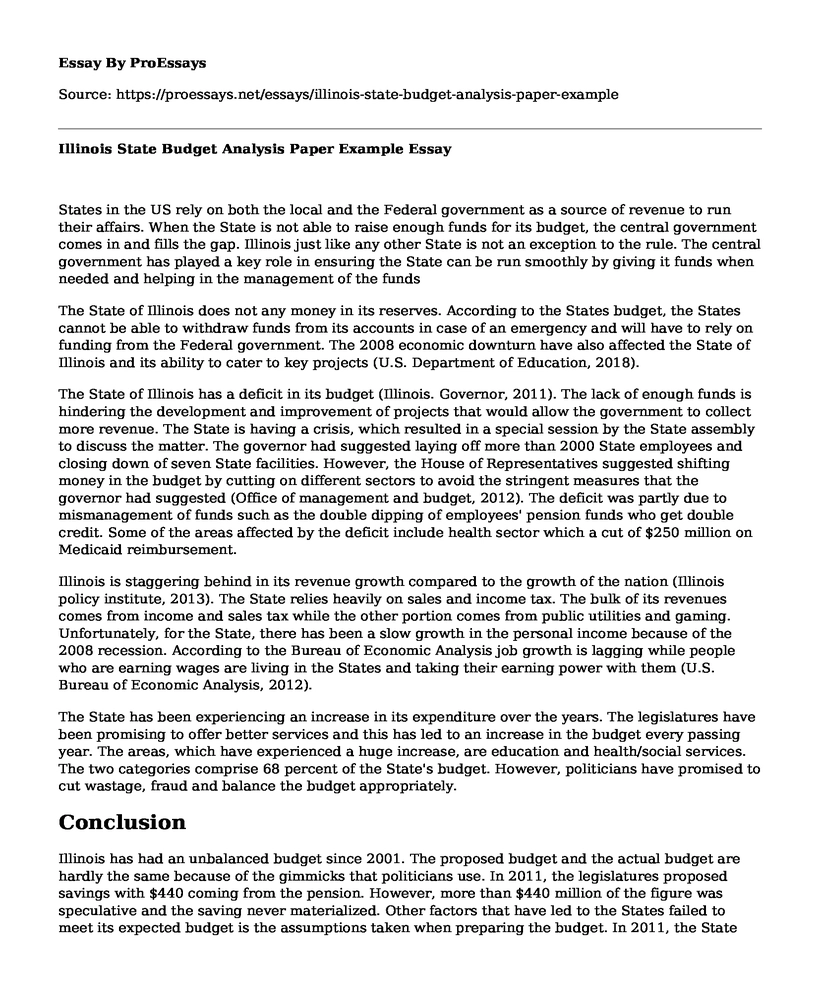States in the US rely on both the local and the Federal government as a source of revenue to run their affairs. When the State is not able to raise enough funds for its budget, the central government comes in and fills the gap. Illinois just like any other State is not an exception to the rule. The central government has played a key role in ensuring the State can be run smoothly by giving it funds when needed and helping in the management of the funds
The State of Illinois does not any money in its reserves. According to the States budget, the States cannot be able to withdraw funds from its accounts in case of an emergency and will have to rely on funding from the Federal government. The 2008 economic downturn have also affected the State of Illinois and its ability to cater to key projects (U.S. Department of Education, 2018).
The State of Illinois has a deficit in its budget (Illinois. Governor, 2011). The lack of enough funds is hindering the development and improvement of projects that would allow the government to collect more revenue. The State is having a crisis, which resulted in a special session by the State assembly to discuss the matter. The governor had suggested laying off more than 2000 State employees and closing down of seven State facilities. However, the House of Representatives suggested shifting money in the budget by cutting on different sectors to avoid the stringent measures that the governor had suggested (Office of management and budget, 2012). The deficit was partly due to mismanagement of funds such as the double dipping of employees' pension funds who get double credit. Some of the areas affected by the deficit include health sector which a cut of $250 million on Medicaid reimbursement.
Illinois is staggering behind in its revenue growth compared to the growth of the nation (Illinois policy institute, 2013). The State relies heavily on sales and income tax. The bulk of its revenues comes from income and sales tax while the other portion comes from public utilities and gaming. Unfortunately, for the State, there has been a slow growth in the personal income because of the 2008 recession. According to the Bureau of Economic Analysis job growth is lagging while people who are earning wages are living in the States and taking their earning power with them (U.S. Bureau of Economic Analysis, 2012).
The State has been experiencing an increase in its expenditure over the years. The legislatures have been promising to offer better services and this has led to an increase in the budget every passing year. The areas, which have experienced a huge increase, are education and health/social services. The two categories comprise 68 percent of the State's budget. However, politicians have promised to cut wastage, fraud and balance the budget appropriately.
Conclusion
Illinois has had an unbalanced budget since 2001. The proposed budget and the actual budget are hardly the same because of the gimmicks that politicians use. In 2011, the legislatures proposed savings with $440 coming from the pension. However, more than $440 million of the figure was speculative and the saving never materialized. Other factors that have led to the States failed to meet its expected budget is the assumptions taken when preparing the budget. In 2011, the State expected to raise revenue by selling the James Thompson centre for $300 million. However, the building was never sold leading to a deficit in the State's budget.
References
Illinois policy institute. (2013). Illinois Policy. Retrieved from https://www.illinoispolicy.org/
Illinois. Governor. (2011). The Illinois state budget. Springfield: The Governor.
The Institute for Illinois Fiscal sustainability. (2012). State of Illinois FY2019 Recommended Operating Budget: Analysis and Recommendations | The Civic Federation. Retrieved from https://www.civicfed.org/iifs/FY19ILRecommendedBudget
Office of management and budget. (2012). Fiscal Year 2019 Proposed Budget - Illinois Office of Management & Budget. Retrieved from https://www2.illinois.gov/sites/budget/Pages/default.aspx
U.S. Bureau of Economic Analysis. (2012). U.S. Bureau of Economic Analysis (BEA). Retrieved from https://www.bea.gov/
U.S. Department of Education. (2018, June 28). U.S. Department of Education Budget History. Retrieved from https://www2.ed.gov/about/overview/budget/history/index.html
Cite this page
Illinois State Budget Analysis Paper Example. (2022, Aug 05). Retrieved from https://proessays.net/essays/illinois-state-budget-analysis-paper-example
If you are the original author of this essay and no longer wish to have it published on the ProEssays website, please click below to request its removal:
- Paper Example on Creating an Operating Budget
- Momentum Investment Paper Example
- Real Estate Investment Paper Example
- Person Gives Police Consent to Search: Three Forms Explored
- Essay Example on Edmonton Police Service: Values, Quality of Life & Safety
- Effective Police Operations: Patrols, Communications, Challenges & More - Research Paper
- The Effect of Foreign Banks on the National Economies of Cambodia and Pakistan - Paper Sample







